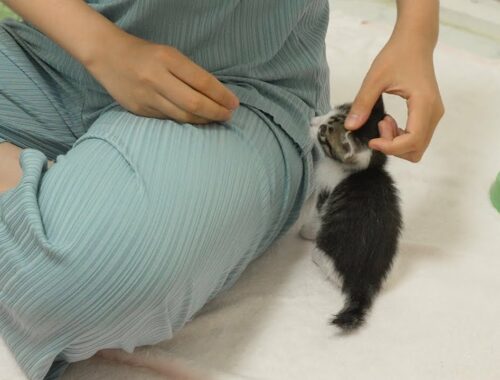Feral kittens are typically found outdoors. When they are in close quarters with humans, they may be hissy, scared, and even aggressive.
But how do you befriend and socialize an outdoor kitten?
In this video, we will talk about 6 steps that will help you turn that frightened neighborhood kitten into a new furry friend!
Prepare them for the journey
Animal rescuers often use a drop trap to catch wary kittens. Food is a powerful motivator and drop traps allow you to catch a cat without having to force them into a confined space.
Once trapped, set up the kittens in a large dog crate to begin their socialization journey.
Let the cat make the first move
If you are trying to tame a feral cat, then ignore the cat. A feral cat doesn’t want to be touched, and will probably view any attempts at petting as a threat.
Place some food in front of the kitten and back away. Stand as far away as it takes for the kitten to be comfortable to come out of hiding and eat in front of you.
Keep them coming back for more.
Feral kitten socialization is all about helping the kitten make positive associations with humans.
It is important to provide relaxed, non-threatening enrichment to ensure that the cat feels safe around you and keeps coming back. You want them to know that you’re safe and you are a source of food.
Remember, sounds like loud talking, music, and opening and closing doors may send a nervous kitty running for the hills. Make sure that the room is calm and quiet.
Slowly desensitize them to your voice
The next step is to use feeding times as an opportunity to speak to them quietly with a calm, soothing voice so they get used to the sound of your voice. You can even read them a book or talk with them about your life.
Introduce your scent
Try to get closer bit by bit during each mealtime, gradually decreasing your distance from the kitten as they eat. Continue talking to them throughout the entire meal. Watch for body language signals and back off if the cat is warning you by hissing, growling, or swishing tail.
Slowly desensitize them to your touch
The next step is to start gently touching the kitten while they eat. Focus on favorite areas like head, cheeks and under the chin, but avoid sensitive areas such as their belly or sides.
At every single meal you want to encourage the kittens to get a little more comfortable with different types of human contact.
Consider a calming remedy to help her with the transition
A soothing remedy like catnip, pheromone sprays, or calming supplements can be used to calm or relieve stressed cats.
You may even want to spray yourself with a cat pheromone.
Using calming pheromones for cats can help comfort the animal by sending reassuring messages.
The breakthrough moment
A lot of patience is required to socialize feral cats. Each cat will come around at their own pace regardless of their age – although generally the younger socialize the fastest. You have to follow the cat at their own pace and don’t expect too much too soon.
A breakthrough moment is when the kitten enjoys your company without any treats or food nearby.
Things kittens love
Kittens often need an external heat source to regulate their body temperature. Make sure to provide them with a heating pad to help maintain body warmth for them.
In addition, you can provide the cat with a fur coat because it reminds them of the comfort of their mom.
Another kitten essential is baby blanket. A soft, microfleece blanket provides a soft surface for the kittens to lie on. You can even gently wrap the kitten with baby blanket to give them the comforting feeling of being held.
The importance of playtime
One of the biggest mistakes made when fostering kittens is to only focus on handling. Of course, it’s a huge part of socialization, but that won’t necessarily improve general psychological well-being. This is where playtime makes an impact.
Play decreases stress in cats and increases their confidence.
Respect their space
Once you have turned that frightened neighborhood kitten into a new furry friend, there is still work to be done. The cat will be understandably nervous and require a place to hide when overwhelmed.
If the kitten ever gets shy or is hiding away from you, you don’t want to corner them or pull them out from where they are. You want them to know that you’re safe and you’re a source of fun.



